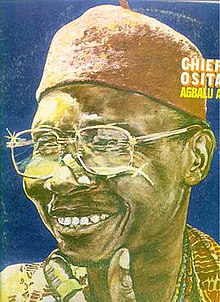Chief Osita Osadebe
| Chief Stephen O. Osadebe | |
|---|---|
 |
|
| Background information | |
| Birth name | Stephen Osita Osadebe |
| Also known as | Osadebe, The Doctor of Hypertension |
| Born | March 1936 |
| Origin | Atani, Anambra, Nigeria |
| Died | 11 May 2007 (aged 71) St. Mary's Hospital Waterbury, Connecticut, United States |
| Genres | Igbo Highlife |
| Occupation(s) | singer, songwriter, record producer |
| Years active | 1958–2007 |
| Labels | Polygram Records Nigeria |
| Associated acts | The Empire Rhythm Orchestra, Prince Nico Mbarga, Rex Lawson, Celestine Ukwu, Eddie Okonta, Victor Olaiya, Fred Coker, Victor Uwaifo |
| Website | Chief Osita at Calabash music |
Chief Stephen Osita Osadebe (March, 1936 — May 11, 2007), often referred to as just Osadebe, was an Igbo Nigerian highlife musician from Atani. His career spanned over 40 years, and he is one of the best known Igbo highlife musicians. His best-known hit was the 1984 single "Osondi Owendi" (Igbo: One man's meat is another man's poison.), which established him as a leader in the highlife genre and was one of Nigeria's popular records ever.
In March 1936, Osadebe was born in Igbo town of Atani in Southeastern Nigeria. He came from a line of singers and dancers in Igboland. His genre, Highlife encompassed Igbo musical elements. Along with this, calypso, samba, bolero, rumba, jazz and waltz were also present in Osadebe's musical style. It was in his high school years in Onitsha, a major commercial city near Atani, that Osadebe grew interested in music.
Osadebe started his career singing at nightclubs in Lagos in the southwestern region of Nigeria. He had been a part of The Empire Rhythm Orchestra, led by E. C. Arinze in which he had learned much of his music skills. A prolific composer, Osadebe released his first album in 1958, and went on to write over 500 songs; half of which were released commercially. After stints with the Stephen Amache Band the Central Dance Band, in around 1964 Osadebe struck out as a bandleader with his group the Sound Makers.
As he became better established, Osadebe's style matured to include social commentary, similar to, but not as confrontational as Fela Kuti. Personal trials and tribulations was usually the main topic of his commentaries. Osadebe often extended his tracks for his audiences enjoyment, allowing room for 'people on the dance floor' to indulge in the songs.
"Osadebe succeeded in breaking away from the conventional big band format established by the pioneers of the music, a format that favoured melodic progressions that were in the common meter, church hymnal tradition. He succeeded in completely transforming highlife into the call-and-response pattern of African music."
...
Wikipedia
